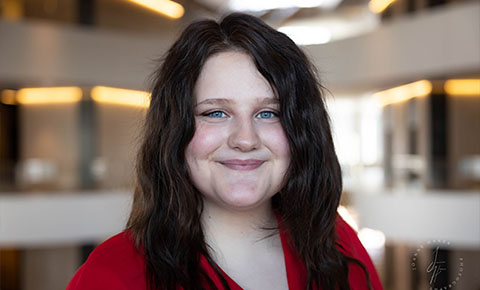Lester Wins Wildcat Impact Award

Northwestern University undergraduate Emily Lester, co-president of Campus Kitchen, received a Wildcat Impact award for her work managing the group’s activities through the COVID-19 pandemic.
Campus Kitchen is a student-run sustainability organization that recovers food from Northwestern's dining halls and redistributes it to people in need.
Lester and co-president Sean Pascoe went “above and beyond to keep the important work going that involved collecting unserved food from around campus and distributing it to the Evanston and Chicago communities,” her nominators wrote.
Their work also involves high levels of collaboration with Compass, Northwestern Dining, Northwestern students, and several community-based organizations like the McGaw YMCA and Evanston Community Fridges.
Lester, who is studying social policy at the School of Education and Social Policy, is passionate about examining inequities in systems through the lenses of psychology, global health studies, disability rights, international studies, and economics. In 2021, she was a summer undergraduate research assistant for the Institute for Policy Research.
She recently spoke to us about everything from how she found Northwestern in middle school to why she’s passionate about fighting food insecurity.
Lester attended Center for Talent Development summer camps in middle school: Originally from Lebanon, Missouri, she was in seventh grade when a teacher handed her a pamphlet about Center for Talent Development summer camps. She called CTD "transformative” in part because the experience including traveling to the airport alone for the first time and living in a dorm without her parents. “But the biggest thing was getting to be with more diverse people from all over the world. I was surrounded by people who liked to learn as much as me, which felt very expansive,” she said.
She’s using her background into a catalyst for positive change. Lester’s father has been living with amyotrophic lateral sclerosis, or ALS, for three decades. The neurodegenerative disease affects nerve cells in the brain and spinal cord; he communicates through blinking and breathes with a ventilator. “My family has always relied on social security and disability income due to my dad’s disability,” she says. “I saw from a young age how policies would impact my family on a financial level, as well as how different rules did not account for my family’s situation.”
She became involved with Campus Kitchens Northwestern before stepping on campus. It was the fall of 2020 during the COVID-19 pandemic, and she was attending class remotely via Zoom. When she arrived in Evanston in 2021, she joined the leadership team and started working a weekly recovery shift.
Much of her original work focused on the transition out of COVID. In addition to learning how to operate the organization, they needed to show community partners and the dining team they were a trusted and reliable partner. They also needed to attract student interest; Lester and Pascoe achieved that on all levels.
Supply chain issues wreaked havoc on their efforts. As a liaison between the dining hall and the Evanston community “it was difficult to make commitments to our partners when the supply chain issues caused the amount of food we were getting to be inconsistent,” Lester says.
She’s studying social policy and minoring in global health studies: Everything clicked in high school after hearing a woman talk about her work with global food insecurity. Lester saw the importance of creating macro-level changes to improve people's lives. “Learning about this woman’s job clarified what I had been thinking about since I was a child,” she says. “’Social policy’ was the word I was looking for to describe what I wanted to do.” The global health minor is an important piece of the puzzle because “I grapple with how volunteering impacts the communities served, so delving into the ethics behind helping those in need is really valuable.”
Food insecurity is her number one issue. It affects people on a daily basis and impacts every aspect of life. “If we want to help improve mental health, the ability to work, and reduce stress, starting with food is a good route,” she says.